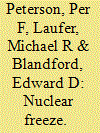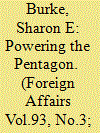|
|
|
Sort Order |
|
|
|
Items / Page
|
|
|
|
|
|
|
| Srl | Item |
| 1 |
ID:
130464


|
|
|
|
|
| Publication |
2014.
|
| Summary/Abstract |
Nuclear power remains the best way to produce large amounts of electricity reliably for homes and businesses. That is why the continuing deficit in nuclear innovation is so troubling, and why Washington needs to seek additional strategies to incentivize and support progress.
These days, the long-term role that nuclear power will play in the global energy market remains uncertain. That would have come as a surprise to the scientists and engineers who, during the 1950s and 1960s, pioneered the study of nuclear fission, built test reactors, and designed nuclear-powered airplanes and rockets. They would also have been surprised, and likely dismayed, that the light-water reactor -- the technology that powered the first nuclear submarine, in 1954 -- remains the dominant commercial technology for producing fission energy.
|
|
|
|
|
|
|
|
|
|
|
|
|
|
|
|
| 2 |
ID:
130465


|
|
|
|
|
| Publication |
2014.
|
| Summary/Abstract |
The Defense Department is the United States' largest energy consumer, but it's also a major incubator of cutting-edge technologies. To cut fuel demands and meet new threats, the Pentagon is transforming the U.S. military from an organization that uses as much fuel as it can get to one that uses only as much as it needs.
In the immediate aftermath of World War II, the U.S. naval aviator Thomas Moorer questioned Takeo Kurita, a former vice admiral of the Imperial Japanese Navy, as part of the U.S. military's postwar interrogation of Japanese commanders. Kurita told Moorer that one of the most significant reversals of fortune Japan had suffered during the war was the loss of fuel supplies. "We ran out of oil," Kurita said, and by the end of the war, the Japanese military had grown so desperate, it was operating its equipment on fuel distilled from old tires, rice, and even pine needles. "What I learned then," Moorer would note years later, "was never lose a war, and the way to lose a war is to run out of oil."
|
|
|
|
|
|
|
|
|
|
|
|
|
|
|
|
|
|
|
|
|